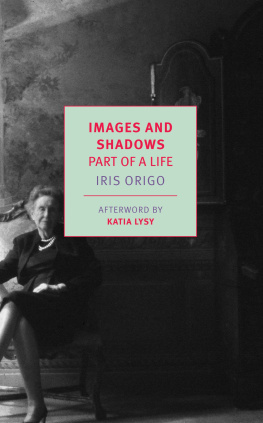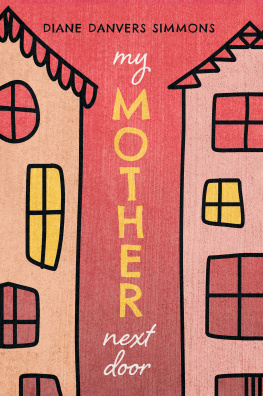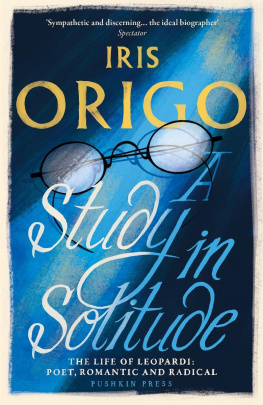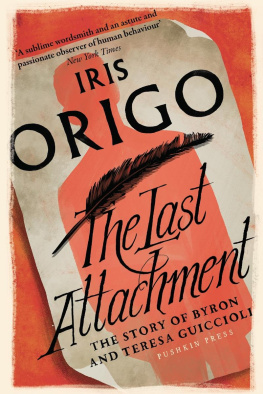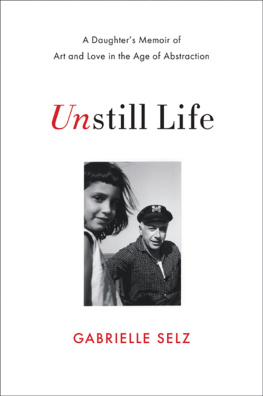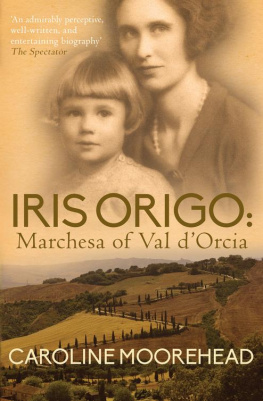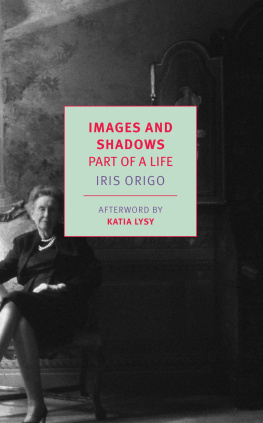
IRIS ORIGO (19021988) was a biographer and writer born in Britain to an aristocrat mother and a wealthy American father. She lived in Italy and devoted much of her life to the improve-ment of the Tuscan estate at La Foce that she purchased with her husband, Antonio Origo, in the 1920s. Their son, Gianni, died of meningitis in 1933, after which she embarked on a writing career, publishing a successful biography, Leopardi: A Study in Solitude. Traveling in London in the 1930s, she befriended Virginia Woolf and became romantically involved with L. H. Myers (the author of he Root and the Flower). During World War II, she gave birth to two daughters, Benedetta and Donata, and, together with Antonio, sheltered refugee children and assisted many escaped Allied prisoners of war and partisans in defiance of Italys Fascist regime and Nazi occupation forces. Her memoirs of life in Italy in the war period are collected in two volumes, A Chill in the Air: An Italian War Diary, 19391940 (first published in 2017) and War in Val dOrcia: An Italian War Diary, 1943 1944 (first pub-lished in 1947). In 1976, she was made a Dame Commander of the Order of the British Empire. She died at La Foce.
KATIA LYSY , a granddaughter of Iris Origo, has worked in publishing and as a journalist and translator. She lives between Rome and southern Tuscany, where she assists her mother, Benedetta, in the management of La Foce.
OTHER BOOKS BY IRIS ORIGO PUBLISHED BY NYRB CLASSICS
A Chill in the Air: An Italian War Diary, 19391940
Introduction by Lucy Hughes-Hallett
Afterword by Katia Lysy
War in Val dOrcia: An Italian War Diary, 19431944
Introduction by Virginia Nicholson
IMAGES AND SHADOWS
Part of a Life
IRIS ORIGO
Afterword by
KATIA LYSY
NEW YORK REVIEW BOOKS

New York
THIS IS A NEW YORK REVIEW BOOK
PUBLISHED BY THE NEW YORK REVIEW OF BOOKS
435 Hudson Street, New York, NY 10014
www.nyrb.com
Copyright 2017 by the Estate of Iris Origo
Afterword copyright 2019 by Katia Lysy
All rights reserved.
Cover image: Milton Gendel, Iris Origo, 1979; courtesy Archivio Gendel, Fondazione Primoli, Rome
Cover design: Katy Homans
Library of Congress Cataloging-in-Publication Data
Names: Origo, Iris, 19021988, author.
Title: Images and shadows : part of a life / by Iris Origo.
Description: New York : New York Review Books, [2019] | Series: New York
Review Books classics | Originally published in 1970. | Includes index. Identifiers: LCCN 2019007414 (print) | LCCN 2019016174 (ebook) | ISBN 9781681373669 (epub) | ISBN 9781681373652 (alk. paper)
Subjects: LCSH: Origo, Iris, 19021988. | CriticsItalyBiography. | Women criticsItalyBiography. | Berenson, Bernard, 18651959Friends and associates. | Orcia River Valley (Italy)Intellectual life20th century. | Orcia River Valley (Italy)Biography.
Classification: LCC PN75.O7 (ebook) | LCC PN75.O7 A3 2019 (print) | DDC 818/.5209 [B] dc23
LC record available at https://lccn.loc.gov/2019007414
ISBN 978-1-68137-366-9
v1.0
For a complete list of titles, visit www.nyrb.com or write to:
Catalog Requests, NYRB, 435 Hudson Street, New York, NY 10014
CONTENTS
To Antonio
Behold! human beings living in an underground den which has a mouth open towards the light... here they have been from their childhood, and have their legs and necks chained so that they cannot move, and can only see before them, being prevented by the chains from turning their heads. Above and behind them a fire is blazing at a distance, and between the fire and the prisoners there is a raised way; and you will see, if you look, a low wall built along the way, like the screen which marionette players have in front of them, over which they show the puppets.
I see.
And do you see, I said, men passing along the wall carrying all sorts of vessels, and statues and figures of animals made of wood and stone and various materials, which appear over the wall?...
You have shown me a strange image, and they are strange prisoners.
Like ourselves, I replied; and they see only their own shadows, or the shadows of one another, which the fire throws on the opposite wall of the cave.
True, he said...
To them, I said, the truth would be literally nothing but the shadows of the images...
And now look again, and see what will naturally follow, if the prisoners are released...
At first when any of them is liberated and compelled suddenly to stand up... When he approaches the light his eyes will be dazzled... he will require to grow accustomed to the sight of the upper world. At first he will see shadows best, next the reflections of men and other objects in the water, and then the objects themselves; then he will gaze upon the light of the moon and the stars and the spangled heaven...
Last of all he will be able to see the sun.
PLATO : The Republic, VII, 3rd edn. (1888)
trs. Benjamin Jowett
INTRODUCTION
De temps autre, on est soi, un instant.
PRE BOULOGNE
I T HAS sometimes been pointed out to me that I have had a very varied and interesting life, have lived in some extremely beautiful places and have met some remarkable people. I suppose it is true, but now that I have reached the end game, I do not find myself dwelling upon these pieces on the board. The figures that still stand out there now are the people to whom, in different ways and in different degrees, I have been bound by affection. Not only are they the people whom I most vividly remember, but I realise that it is only through them that I have learned anything about life at all. The brilliant talk I heard at I Tatti in my youth, in Bloomsbury in the thirties, in New York and Rome in later years, has lost some of its glitter. I was tipped, as Desmond MacCarthy once remarked about Santayanas writings, with fairy gold. All that is left to me of my past life that has not faded into mist has passed through the filter, not of my mind, but of my affections. What was not warmed by them is now for me as if it had never been.
One consequence of this is thatsince the people who have touched my heart have belonged to different countries, as well as to very different backgroundsI have been able to participate vicariously in some aspects of life beyond the field of my own personal experience: to catch a glimpse, as it were, of worlds seen through the peep-hole of someone elses stage. But equally many other worlds have remained closed to me. Because, for instance, I never happened to have in my youth an intimate friend in France or Germanynot even a French or German governess to whom I was particularly attachedI know no more about those countries than what has been told me by books or by my eyes. On the other hand my affection for the gentle, courageous woman who was my first Italian teacher, Signora Signorini, and later on, for the fiery genial professore with whom I first read Homer and Virgil, acquainted me once for all and from within with the life of the educated Tuscan borghesiaa world whose values, at the time of my childhood, were still those of De Amicis Cuore. And equally it was my love for my grandfather, Lord Desart, which bestowed on me the flavour of life as it used to be in the Irish country house in which I spent my summer holidaysa world of blue distances and infinite leisure and ease, flavoured with the scent of sweet peas and the crisp clear taste of red currants, in which the doors were always open to children, dogs, and neighbours, and I would jog on my pony with my grandfather from cottage to farm, or down the green rides in the beech woods, where one might see, in the early morning, a vixen and her cubs slinking away through the tall grass.

